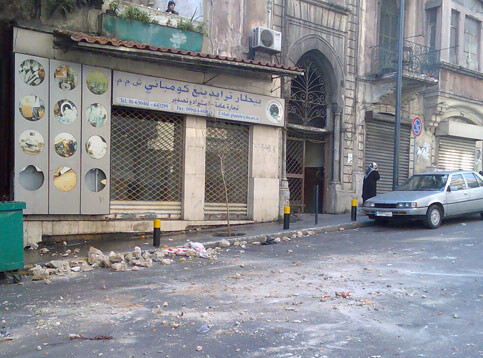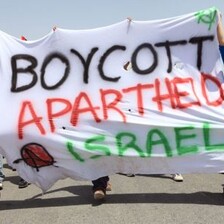Beirut 25 January 2007

Debris litters a Beirut street after a roadblock is cleared, 23 January 2007. (Sami Hermez)
Today, January 25, 2007, violence broke out around 2:30pm at the Beirut Arab University, which is around the sports stadium close to the airport road. According to one report, it seems like the original conflagration occurred in the cafeteria and was then taken out into the streets. By now most people have seen images of the chaos that ensued. Many of us learnt about it when we first tried to use our phones and found all lines down.
It is 11:30pm as I sit to write this; I am locked in my apartment along with the rest of the residents of Beirut. There is a military enforced curfew that went into affect at 8:30pm and will last until tomorrow morning at around 10:00 or 11:00am. Speaking to my family outside of Beirut, in Mansourieh, it seems like the rest of the country is functioning normally. I step outside onto my balcony and the silence is deafening. There is no one walking in the streets, no taxis waiting around, Hamra Street is deserted. But suddenly I see movement. A jeep whizzes by but as I get a glimpse I realize it is a military vehicle. Nothing else seems to be moving though in the distance I hear the sound of mopeds.
Reports say that four people died today, and there are more than 30 injured, 13 of which are soldiers. This brings the count up to nine since Tuesday. What do we call the events around us? Clashes, riots, scattered violence, civil strife, war? The way we define things governs the way we act and react. And now we are at a moment of loss, partly because we are unable and partly because we are unwanting to define; but the media will jump in to define for us.
I speak to a friend on MSN and she calls this a civil war, others are saying this is just an outbreak of violence and the more we call it war the more our anticipations will lead us down that path. At some point though we need to recognize the situation at hand; perhaps defining in advance can minimize the impending catastrophe rather than if we recognize the disaster in hindsight. If we consider that the war has begun we can work to end it; if we deny that it has begun then we will continue to triage the situation until it turns into a state of emergency.
At 6:00pm I walk towards Hamra Street; I am shocked that it is empty. There are no cars in the street and all of the shops seem closed. In Beirut people are very afraid, you can feel it.
The most disturbing part of today must have been the news that there were snipers in the buildings firing into the crowds. The media had been repeating this since the afternoon and the news had traveled fast. I personally told people in other countries on MSN about the snipers, scaring them and creating a mood of war. Now Al-Jazeera is saying that maybe it was too soon to report this and they cannot really confirm if this is true or not. There is a sense that the shootings did not come from snipers.
Al-Jazeera was saying that it seems there are people trying to ignite the situation. The broadcaster says it might not be purely the opposition or the pro-government forces; he says it could be neither of these but some third party. He is implying the presence of that ever-looming outsider that gets involved in Lebanese affairs. The discourse of the outsider intervening and always responsible for Lebanon’s internal strife is so powerful that we look to it as a way to save ourselves from the path of violence. Is the broadcaster underhandedly pointing the finger at the Mossad or CIA?
Listening to the broadcaster, my mind wanders to what is beneath this media reality in front of us. My mind wanders to what is unseen, what lies beneath and behind the scenes. I remember the saying: “Things are not always as they seem.” I wonder what really is. I think we all do.
Later we get a hint that the story of snipers seems to be true. In a telephone statement to Al-Manar TV, Nasrallah spoke directly about these snipers and asked that they be found and their identities made known. He also added that any Lebanese who attacks or opens fire on a fellow Lebanese is an Israeli, because this only serves Israel. These are powerful words. From one perspective they are strong enough to stop any Lebanese from attacking their fellow compatriot, but at the same time it allows a Lebanese to retaliate with deadly vengeance because the assailant is no longer Lebanese but Israeli. Depending on your interpretation you can see this as an opening for violence or not.
I flip through the different Lebanese news channels. On Hariri’s Future TV, the newscaster is in a hospital but they are not broadcasting the screams, chants and speeches of people in the hospital. Is this due to a technical error or because they do not want us to hear the sectarian language spewing forth? I hope it is the latter.
I want to go out on the street, but for what? You can’t stop either side, there is no enemy to attack, and it is too dangerous to go and observe; I feel so useless and powerless in all this violence. So I stay at home with friends and we lighten the mood with cynicism and humor.
Reflecting back on today, I am left thinking of how the memory of the civil war is so powerful in everyone’s imagination. The media continues to play this image back for us; on New TV one newscaster tells another that the street fighting, the snipers and all that is happening must remind everyone of the civil war. The day has been spent partly remembering the past and partly trying to survive the present. Do we hide behind the memories of past wars because they are what we know, a comfort that allows us to deal with the uncertainty of future violence?
Life has become so uncertain, tense, frustrating, exciting and nerve racking. Adrenaline shoots out at you at awkward moments in the day: while you are watching the news of violence so close to where you live or during conversations about the anticipation of violence getting closer and closer — from the region, to the neighborhood, to your street, until it is marked on your body.
And now … the news goes to commercial break. I hope that when I wake tomorrow both sides will have realized that they must compromise or return to dialogue, and that nine deaths in the name of state-building is nine deaths too many.
Sami Hermez is a lecturer at the American University of Beirut teaching a course on the anthropology of violence and has been active in relief and redevelopment projects in the South of Lebanon. He can be reached at shermez@princeton.edu.
Related Links





